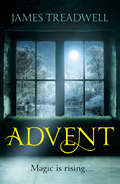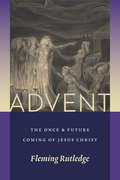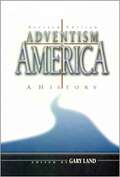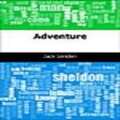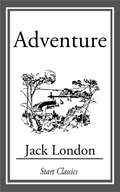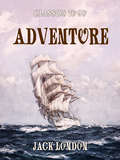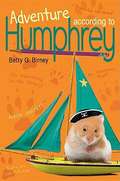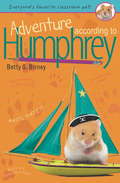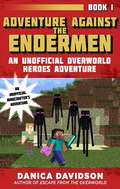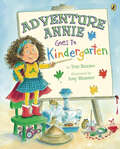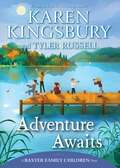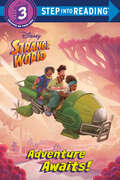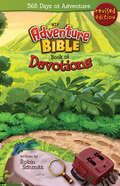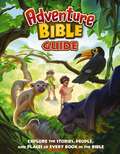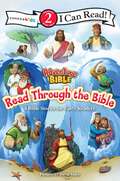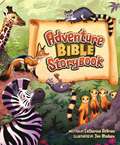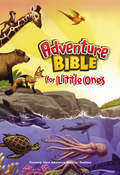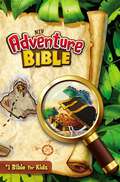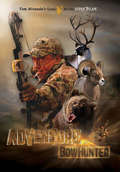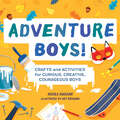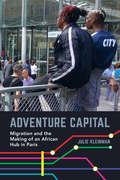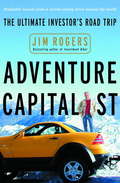- Table View
- List View
Advent: Advent Trilogy 1
by James TreadwellFor centuries it has been locked away Lost beneath the sea Warded from earth, air, water, fire, spirits, thought and sight. But now magic is rising to the world once more. And a boy called Gavin, who thinks only that he is a city kid with parents who hate him, and knows only that he sees things no one else will believe, is boarding a train, alone, to Cornwall. When he arrives, there is no one there to meet him.
Advent: The Once and Future Coming of Jesus Christ
by Fleming RutledgeAdvent, says Fleming Rutledge, is not for the faint of heart. As the midnight of the Christian year, the season of Advent is rife with dark, gritty realities. In this book, with her trademark wit and wisdom, Rutledge explores Advent as a time of rich paradoxes, a season celebrating at once Christ&’s incarnation and his second coming, and she masterfully unfolds the ethical and future-oriented significance of Advent for the church.
Advent: The Once and Future Coming of Jesus Christ
by Fleming RutledgeAdvent, says Fleming Rutledge, is not for the faint of heart. As the midnight of the Christian year, the season of Advent is rife with dark, gritty realities. In this book, with her trademark wit and wisdom, Rutledge explores Advent as a time of rich paradoxes, a season celebrating at once Christ’s incarnation and his second coming, and she masterfully unfolds the ethical and future-oriented significance of Advent for the church.
Adventism in America: A History
by Gary LandWritten by Adventist scholars who felt a need to better establish and understand their denominational identity and the foundation of their theological beliefs, this book offers a comprehensive, nonapologetic history of the denomination. <p><p> Accurate in scholarship, comprehensive in scope, and objective in tone, it synthesizes present knowledge of the history of the Adventist church in America, and lays the basis for further investigation.
Adventure
by Jack LondonTrajectory presents classics of world literature with 21st century Adventure tells about the confrontation between a man who finds himself alone in front of a plantation - harassed by blacks cannibals - and a bold, independent and liberated feminist woman, Joan Lackland, who's arrival at the plantation turns everything upside down... <P> <P> Published in 1911, this novel, a devastating portrayal of colonialism and slavery set in the Solomon Islands, has generated considerable controversy since its publication over the question of whether London shared the racist beliefs of his characters or, on the contrary, was merely presenting them accurately! Our original-text editions include the following visual enhancements to foster a deeper understanding of the work: Word Clouds at the start of each chapter highlight important words. Word, sentence, paragraph counts, and reading time help readers and teachers determine chapter complexity. Co-occurrence graphs depict character-to-character interactions as well character to place interactions. Sentiment indexes identify positive and negative trends in mood within each chapter. Frequency graphs help display the impact this book has had on popular culture since its original date of publication. Use Trajectory analytics to deepen comprehension, to provide a focus for discussions and writing assignments, and to engage new readers with some of the greatest stories ever told. "Adventure" by Jack London is an action-packed tale that takes place in the Solomon Islands! David Sheldon, a British coconut plantation owner, falls in love with Joan Lackland, an energetic American woman, and adventure ensues.
Adventure
by Jack LondonHe was a very sick white man. He rode pick-a-back on a woolly-headed, black-skinned savage, the lobes of whose ears had been pierced and stretched until one had torn out, while the other carried a circular block of carved wood three inches in diameter. The torn ear had been pierced again, but this time not so ambitiously, for the hole accommodated no more than a short clay pipe. The man-horse was greasy and dirty, and naked save for an exceedingly narrow and dirty loin-cloth; but the white man clung to him closely and desperately. At times, from weakness, his head drooped and rested on the woolly pate. At other times he lifted his head and stared with swimming eyes at the cocoanut palms that reeled and swung in the shimmering heat. He was clad in a thin undershirt and a strip of cotton cloth, that wrapped about his waist and descended to his knees. On his head was a battered Stetson, known to the trade as a Baden-Powell. About his middle was strapped a belt, which carried a large-calibred automatic pistol and several spare clips, loaded and ready for quick work.
Adventure (Classics To Go)
by Jack LondonThe novel explores the themes of domination of one people over the others, the differences between races, emancipation of women, and the strength of the human spirit, strengthened in a struggle with the nature and society. (Wikipedia)
Adventure According to Humphrey (According to Humphrey #5)
by Betty G. BirneyHumphrey is in for his biggest adventure yet! <P><P>When his friends begin studying the ocean and sailing, he not only discovers the new and exciting world of the library, but also stows away aboard a model boat and takes a very perilous sail on Potter's Pond. <P><P>Even with all this excitement, he finds time to smooth rough waters between Gail and her free-spirited mom, help competitive Kirk see that winning isn't everything, and investigate whether his pal Aldo is really planning to become a pirate and sail the high seas.
Adventure Against the Endermen: An Unofficial Overworld Heroes Adventure, Book One (Unofficial Overworld Heroes Adventure #1)
by Danica DavidsonAfter discovering a portal to Earth and battling the evil Herobrine and his army of vicious mobs, Steve and his friends are known throughout the Overworld as heroes. Stevie’s enjoying the attention—that is, until he tries to show off and instead falls down a mineshaft. At the bottom of the mineshaft, Stevie finds an Ender crystal with mysterious powers. Soon the Overworld is in danger once again, this time from vicious Endermen! Mayor Alexandra summons Stevie, Alex, Maison, Yancy, and Destiny to try and stop the attacks. When the friends investigate, they quickly realize that the Endermen are looking for something. Could it be Stevie’s Ender crystal? Soon the group of friends—now an Overworld task force—are caught up in a battle larger than any they could have imagined. Can they protect the world of Minecraft from Endermen—and the larger threat of the crystal?Fans of Minecraft will race to the end of this first installment in the Unofficial Overworld Heroes Adventure series by Danica Davidson!
Adventure Annie Goes to Kindergarten
by Toni BuzzeoFrom the author of the 2013 Caldecott Honor Book, ONE COOL FRIEND!Annie Grace wears her "Adventure Annie" cape to her first day of kindergarten, and proceeds to barrel through the day, searching for adventure in every moment. Her interpretation of the class's Gold Star Rules isn't exactly what her teacher, Mr. Todd, had in mind. But somehow Annie does manage to save the day when two of her classmates get lost on their way to retrieve the afternoon snack. Spirited and funny, this is an introduction to kindergarten that will please kids and teachers alike.
Adventure Awaits (A Baxter Family Children Story)
by Karen Kingsbury Tyler RussellIn the fourth book in Karen Kingsbury&’s and Tyler Russell&’s beloved series about the Baxter children, Kari and Ashley go through the ups and downs of summer camp.School science camp is a few weeks away, but Ashley and Kari Baxter have very different feelings about going. With the help of their siblings, Kari and Ashley prepare for wild experiments and the challenges of the great outdoors, and together they learn what it means to plan for an experience they won&’t forget. In the process, all five Baxter Children learn how to make new friends and that adventure awaits in the everyday. They just have to look for it!
Adventure Awaits! (Step into Reading)
by RH DisneyThis Step 3 Step into Reading leveled reader is based on the Disney film Strange World—in theaters on November 23, 2022!Walt Disney Animation Studios&’ Strange World journeys deep into an uncharted and treacherous land where fantastical creatures await. Directed by Don Hall, written by Qui Nguyen, and produced by Roy Conli, Strange World arrives in theaters on November 23, 2022. Children ages 6 to 8 will love this Step 3 Step into Reading leveled reader based on the animated feature film. Step 3 readers feature engaging characters in easy-to-follow plots about popular topics. They are for children who are ready to read on their own.
Adventure Bible Book of Devotions, NIV
by Robin Schmitt<P>Grab your spyglass and compass and set sail for adventure! <P>Like a map that leads to great treasure, this revised edition of the NIV Adventure Bible Book of Devotions takes kids on a thrilling, enriching quest.<P> This yearlong devotional is filled with exciting fictional stories about kids finding adventure in the real world.<P> Boys and girls will learn more about God and the Bible, and be inspired to live a life of faith—the greatest adventure of all.<P>Companion to the Adventure Bible, the #1 bestselling Bible for kids.
Adventure Bible Guide: Explore the Stories, People, and Places of Every Book in the Bible (Adventure Bible)
by ZondervanExplore the Bible like never before! This companion to the bestselling Adventure Bible gives young readers the key details of every book of the Bible at their fingertips. With kid-friendly overviews of Genesis through Revelation and full-color infographics, maps, and images, children will strengthen their faith and gain a deeper understanding of the most important story ever told.The Adventure Bible Guide takes readers 8–12 on a fun-filled, informative journey toward truly understanding God&’s Word. This immersive reference guide gives clear, crisp insights into the Bible book by book, including:key details and events that are clearly laid out, in words kids can easily understandcolorful infographics that include historical information, significant events and details, and important biblical characterscallouts with fun facts and key takeawaysmaps that help readers understand where each part of the Bible occurredimages of artifacts and important places that help bring the Bible to lifeThis book is made to be used alongside the Bible to help readers better comprehend the context and background of God&’s Word, condensing the most important information in a highly visual, easy-to-understand format, which in turn helps kids connect with the Bible text in new and deeper ways.The Adventure Bible Guide is:perfect for kids 8–12 learning to explore the Bible on their owna great resource for teachers, parents, and homeschoolers to use to engage students in the Bible and biblical historypart of the wider Adventure Bible line, which includes NIV Adventure Bible, Adventure Bible Book of Devotions,?and The Adventure Bible Book of Daring Deeds and Epic Creations
Adventure Bible Read Through the Bible: 8 Bible Stories for Early Readers (Level 2 I Can Read) (Adventure Bible)
by ZondervanPractice important reading skills while reading eight favorite Bible stories in the Adventure Bible Read Through the Bible. Combining the beloved Adventure Bible with the proven I Can Read format, this Level 2 I Can Read collection combines engaging stories, longer sentences, and beautiful illustrations, perfect for building confidence and developing reading skills. Adventure Bible Read Through the Bible:Is ideal for readers ages 4 and up who are reading with helpTeaches Bible stories in an accessible format while growing critical reading skillsIs perfect for back to school, summer reading, homeschool, and Sunday school classroomsComes in hardcover format for longer lasting durability and is value-priced at $16.99Is part of the Adventure Bible brand, recommended by more schools and churches than any other Bible for kids, and has impacted more than 10 million families to date. Adventure Bible Read Through the Bible features 8 beloved Bible stories:God&’s Great CreationNoah&’s VoyageMoses Leads the PeopleJoseph the DreamerRuth and NaomiBrave Queen EstherMiracles of JesusPaul Meets Jesus
Adventure Bible Storybook: An Interactive Adventure Through God's Redemptive Story (Adventure Bible)
by Catherine DevriesThe newest edition to the top-selling Adventure series, this storybook Bible for kids ages 4-7 will start them on a journey of discovering about the Bible and growing with God as they grow up with the Adventure Bible, at every age and stage, beginning with the Bible Storybook and continuing on through age 12 with the NIV edition. At every twist and turn, the Adventure Bible Storybook is filled with—what else—ADVENTURE! Parents and loved ones can be assured that children who read it will learn the main stories and themes from the Bible, but all within a fun, exciting theme of discovering, imagination, and suspense—everything you’d expect from a fantastic adventure. This storybook includes some lesser known stories that are particularly adventurous, such as Paul’s shipwreck on the island of Malta, and when the Israelites went to spy on the people of Canaan. The Adventure Bible Storybook was the 2009 Retailers Choice Award winner in the Children’s Nonfiction category.
Adventure Bible for Little Ones (Adventure Bible)
by Catherine DeVriesThe Adventure Bible for Toddlers starts children ages 2-5 on the journey of a lifetime, teaching them about the Bible&’s great stories and themes. It helps young children grow in their relationship with God using stories and art from the wildly popular Adventure Bible Storybook. With ten beautifully illustrated and beloved Bible stories from the Old and New Testament, this book will stimulate toddlers&’ minds and fill their hearts with love for their heavenly Father.
Adventure Bible, NIV (Adventure Bible)
by Lawrence O. RichardsReady for Adventure? Embark on a fun, exciting journey through God’s Word with the 2013 NIV Adventure Bible. Along the way you’ll meet all types of people, see all sorts of places, and learn all kinds of things about the Bible. Most importantly you’ll grow closer in your relationship with God. Recommended by more Christian schools and churches than any other Bible for kids. Features include: new timelines added to the book intros; new additions to the “People in Bible Times;” new additions to the “Life in Bible Times;” Bible book names appear on page edges to help the reader locate verses; full color; increased content in book introductions; revised tip ins; and QR codes link to additional content online.
Adventure Bowhunter: Tom Miranda's Quest for the Super Slam of North American Big Game
by Tom MirandaJoin adventure bowhunter Tom Miranda as he travels throughout North America in pursuit of the archery Super Slam - all 29 of the continent's big-game animals. Considered the Everest of bowhunting, the Super Slam stands as the pinnacle of archery hunting achievements. Follow Miranda through 13 years and 54 hunts as he chases the incredible Super Slam.
Adventure Boys!: Crafts and Activities for Curious, Creative, Courageous Boys (Adventure Crafts for Kids)
by Nicole DugganActivities that foster creativity, curiosity, and courage in boys ages 6 to 12 Discover exciting new kinds of crafts for kids. Whether your boy adventurer likes to play outside, work with his hands, get creative, or do all three at once—Adventure Boys! has all kinds of awesome ways for him to play. Empower boys and encourage them to try new things. Whether it's creating a backyard racetrack, developing coding skills, or building a neighborhood book exchange, this standout among books of crafts for kids will teach them just how amazing they can be. Go beyond other activity books for kids with: Outdoor skills—Boys will have a blast getting outside as they try activities like building a tree house or growing plants. Handy crafts—This collection of crafts for kids encourages constructive play by showing them how to create everything from air-powered race cars to musical instruments. Creative activities—Inspire creative thinking in boys as they learn how to create stop-motion videos, dye their own clothes, and more. Help boys discover the excitement of trying new things with these super fun crafts for kids.
Adventure Cables: Brave New Stitch Crossings and 19 Knitting Patterns
by Meghan JonesGet ready for a mind-blowing adventure in cables!In this exploration of cable knitting, Meghan Jones goes way beyond the traditional cables of knit stitches crossing over purl stitches. Instead of stopping the overall patterning of the garment when she reaches the cables, she continues the stitch pattern through the cables, working lace, textures, colorwork, and even cables on top of other cables. It is truly an innovative approach to cables and one that will have you drooling over the possibilities.Meghan explains her cable-making process step by step, showing you how to work her charts and patterns. Once you&’ve got the basics, you are ready to work her 19 patterns for sweaters, wraps, socks, and more using her inventive cables. The patterns are divided into five sections based on the type of stitch pattern that is being cabled: texture stitches, lace stitches, cabled stitches, mosaic stitches, and stranded stitches. Pull out those cable needles (or work without—Meghan shows you how and when you can skip the cable needles) and choose a pattern for your knitting adventure!
Adventure Capital: Migration and the Making of an African Hub in Paris
by Julie KleinmanParis’s Gare du Nord is one of the busiest international transit centers in the world. In the past three decades, it has become an important hub for West African migrants—self-fashioned adventurers—navigating life in the city. In this groundbreaking work, Julie Kleinman chronicles how West Africans use the Gare du Nord to create economic opportunities, confront police harassment, and forge connections to people outside of their communities. Drawing on ten years of ethnographic research, including an internship at the French national railway company, Kleinman reveals how racial inequality is ingrained in the order of Parisian public space. She vividly describes the extraordinary ways that African migrants retool French transit infrastructure to build alternative pathways toward social and economic integration where state institutions have failed. In doing so, these adventurers defy boundaries—between migrant and citizen, center and periphery, neighbor and stranger—that have shaped urban planning and immigration policy. Adventure Capital offers a new understanding of contemporary migration and belonging, capturing the central role that West African migrants play in revitalizing French urban life.
Adventure Capitalist: The Ultimate Investor's Road Trip
by Jim RogersBehind the wheel of a sunburst-yellow, custom-built Mercedes, Rogers and his fiancee, began their Adventure They drove through 116 countries, through war zones, deserts, jungles, and blizzards.
Adventure Capitalist: The Ultimate Road Trip
by Jim RogersDrive . . . and grow rich!The bestselling author of Investment Biker is back from the ultimate road trip: a three-year drive around the world that would ultimately set the Guinness record for the longest continuous car journey. In Adventure Capitalist, legendary investor Jim Rogers, dubbed "the Indiana Jones of finance" by Time magazine, proves that the best way to profit from the global situation is to see the world mile by mile. "While I have never patronized a prostitute," he writes, "I know that one can learn more about a country from speaking to the madam of a brothel or a black marketeer than from meeting a foreign minister."Behind the wheel of a sunburst-yellow, custom-built convertible Mercedes, Rogers and his fiancée, Paige Parker, began their "Millennium Adventure" on January 1, 1999, from Iceland. They traveled through 116 countries, including many where most have rarely ventured, such as Saudi Arabia, Myanmar, Angola, Sudan, Congo, Colombia, and East Timor. They drove through war zones, deserts, jungles, epidemics, and blizzards. They had many narrow escapes.They camped with nomads and camels in the western Sahara. They ate silkworms, iguanas, snakes, termites, guinea pigs, porcupines, crocodiles, and grasshoppers.Best of all, they saw the real world from the ground up--the only vantage point from which it can be truly understood--economically, politically, and socially.Here are just a few of the author's conclusions: * The new commodity bull market has started.* The twenty-first century will belong to China.* There is a dramatic shortage of women developing in Asia.* Pakistan is on the verge of disintegrating.* India, like many other large nations, will break into several countries.* The Euro is doomed to fail.* There are fortunes to be made in Angola.* Nongovernmental organizations (NGOs) are a scam.* Bolivia is a comer after decades of instability, thanks to gigantic amounts of natural gas.Adventure Capitalist is the most opinionated, sprawling, adventurous journey you're likely to take within the pages of a book--the perfect read for armchair adventurers, global investors, car enthusiasts, and anyone interested in seeing the world and understanding it as it really is.
